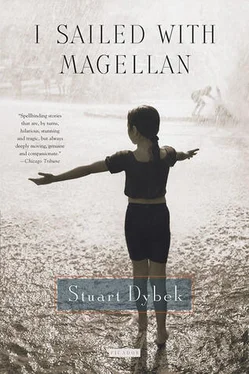Stuart Dybek - I Sailed with Magellan
Здесь есть возможность читать онлайн «Stuart Dybek - I Sailed with Magellan» весь текст электронной книги совершенно бесплатно (целиком полную версию без сокращений). В некоторых случаях можно слушать аудио, скачать через торрент в формате fb2 и присутствует краткое содержание. Год выпуска: 2004, Издательство: Farrar, Straus and Giroux, Жанр: Современная проза, на английском языке. Описание произведения, (предисловие) а так же отзывы посетителей доступны на портале библиотеки ЛибКат.
- Название:I Sailed with Magellan
- Автор:
- Издательство:Farrar, Straus and Giroux
- Жанр:
- Год:2004
- ISBN:нет данных
- Рейтинг книги:4 / 5. Голосов: 1
-
Избранное:Добавить в избранное
- Отзывы:
-
Ваша оценка:
- 80
- 1
- 2
- 3
- 4
- 5
I Sailed with Magellan: краткое содержание, описание и аннотация
Предлагаем к чтению аннотацию, описание, краткое содержание или предисловие (зависит от того, что написал сам автор книги «I Sailed with Magellan»). Если вы не нашли необходимую информацию о книге — напишите в комментариях, мы постараемся отыскать её.
story writer Stuart Dybek returns with eleven masterful and masterfully linked stories about Chicago's fabled and harrowing South Side. United, they comprise the story of Perry Katzek and his widening, endearing clan. Through these streets walk butchers, hitmen, mothers and factory workers, boys turned men and men turned to urban myth.
solidifies Dybek's standing as one of our finest chroniclers of urban America.
I Sailed with Magellan — читать онлайн бесплатно полную книгу (весь текст) целиком
Ниже представлен текст книги, разбитый по страницам. Система сохранения места последней прочитанной страницы, позволяет с удобством читать онлайн бесплатно книгу «I Sailed with Magellan», без необходимости каждый раз заново искать на чём Вы остановились. Поставьте закладку, и сможете в любой момент перейти на страницу, на которой закончили чтение.
Интервал:
Закладка:
“Yeah, this one is more you,” Zip says, fingering the fabric, then asks, “What the hell else you got in there?”
Teo lifts out the pigeon.
This morning, he tells Zip, on his way to work he found the pigeon, a blue checker cock— columba affinis— dragging its wounded wing down an alley, and took it with him to Leader’s, where he kept it in an empty parrot cage in Pets and fed it water and the hemp seed he carries with him as a treat for his own birds. Teo thinks of it as the Spanish pigeon. He doesn’t mention the message, in Spanish, that he found tied to its unbanded leg.
“So it ain’t one of your birds?” Zip asks.
“No.” Teo shakes his head. He’s told Zip how he keeps a palomar , a pigeon loft, on the roof of the three-story building on Blue Island Avenue where he rents a room, but he hasn’t told Zip about the messages arriving there. Teo hasn’t told anyone but the sax player, and he’s gone missing. Over the last month, Teo’s pigeons have been coming home with scraps of paper fastened with red twine to their banded legs. The first message arrived on a misty day, attached to the leg of one of his bronzed archangels. It wasn’t Teo who first noticed it but the sax player, Lefty Antic, who practiced his saxophone on the roof. Teo untied the message, and he and Lefty read the smeared ink: “Marlin.”
“Mean anything to you?” Lefty Antic had asked.
“Just a big fish, man,” Teo had told him.
“Maybe it’s his name, Marlin the Pigeon,” Lefty Antic said.
“No,” Teo said. “They don’t tell us their names.”
The next morning, slipped under his door, Teo found two hundred and fifty dollars in crisp bills rubber-banded in a folded page from a Sportsman’s Park harness-racing form with “Merlin” circled in the fourth race and a note that read, “Thanks for the tip. Lefty.”
Teo saved the winnings and the message in a White Owl cigar box. A few days later, out of a drizzle, a second, barely legible message arrived fastened to one of his racing homers. As far as Teo could tell, it read: “Tibet.” He took the message and half his winnings and knocked on Lefty Antic’s door. There was no answer, and Teo had turned to go when the door opened, emitting the smell of marijuana. The sax player looked hungover, unshaven, eyes bloodshot, and Teo was sorry he’d disturbed him, but Lefty Antic insisted he come in. Together they studied the harness races in the newspaper and found a seven-to-one shot named Tidbit in the fifth race. There was also a buggy driver, J. Tippets, racing in the third and eighth races. Lefty decided they’d better bet both the horse and the driver and went to book it with Johnny Sovereign.
That night Teo had a dream in which his cousin Alaina was riding him. She hadn’t aged — the same bronze-skinned, virgin body he had spied on through the birdshit-splattered skylight on the roof in El Paso where his uncle, Jupo, kept a palomar. Uncle Jupo had taken him in when Teo was fourteen after his mother had run off with a cowboy. It became Teo’s job to care for his uncle’s pigeons. He was seventeen when Uncle Jupo caught him on the roof with his trousers open, spying on Alaina in her bath. His uncle knocked him down and smashed Teo’s face into the pebbled roof as if trying to grind out his eyes, then sent him packing with eight dollars in his pocket. In the dream, Alaina still looked so young that Teo was ashamed to have dreamed it. The pain of her love bites woke him at dawn, and even after waking, his nipples ached from the fierce way her small teeth had pulled at his body, as if his flesh was taffy. Waiting under his door was an envelope with eight hundred dollars and a note: “It was the driver. Thanks, Lefty.”
The third message arrived in a rainstorm. “Lone Star.” Teo woke Lefty Antic out of a drunken stupor. They pored over the harness races, but the only possibility was a driver named T. North whose first name, Lefty thought, was Tex, and whose last name suggested the North Star. Then they checked the thoroughbreds at Arlington, and found a long shot named Bright Venus. “The Evening Star!” Lefty said, smiling. Track conditions would be sloppy, and Bright Venus was a mudder. Lefty had the shakes so bad he could barely get dressed, but, convinced it was the score they’d been building to, he went off to lay their bets with Sovereign. Teo bet a thousand to win.
That night he had a nightmare that he was in El Paso, where he’d begun his career as a luchador , wrestling on the Lucha Libre circuit at fiestas and rodeos. In the dream he was wrestling the famous Ernesto “La Culebra” Aguirre, the Snake, named for the plumed serpent Quetzalcoatl, the Aztec god of human sacrifice. Lucha Libre wrestlers often took the names of superheroes and Aztec warriors, and Teo once really had wrestled the Snake, though not in El Paso. That match was in Amarillo, back in the days when Teo was making a name for himself as a masked luchador called the Hummingbird. He’d come upon his identity in an illustrated encyclopedia of the gods of Mexico. The Hummingbird was Huitzilopochtli, the Mayan sun god; the illustration showed a hawklike warrior bird rising from a thorny maguey plant. According to the caption, the thorns symbolized the Hummingbird’s beak, and after Spain destroyed the Mayan empire, the thorns of the Hummingbird became the crown Jesus wore. Huitzilopochtli’s sacred colors were sun white and sky blue, so those were the colors of the costume — mask, tank top, and tights — that Teo wore. When Teo put on the mask, he’d feel transformed by a surge of energy and strength. As the Hummingbird, he defied the limitations of his body and performed feats that marveled the crowds. He flew from ropes, survived punishing falls, lifted potbellied fighters twice his size high off their feet and slammed them into submission. To keep his identity secret, he would put on his mask miles from the ring, and afterward he wore it home. The nights before bouts he took to sleeping in his mask.
It was at a carnival in El Paso that he saw Alaina again, standing ringside with a group of high school friends, mostly boys. It had been three years since his uncle had thrown him out without giving him a chance to say goodbye to her. The boys must have come to see the rudo billed as El Huracán — the Hurricane — but known to fans as El Flatoso — Windy — for his flatulence in the ring. El Flatoso, with his patented move of applying a head scissors, then gassing his opponent into unconsciousness, was beloved by high school boys and drunks. Teo had been prepared to be part of the farce of fighting him until he saw Alaina in the crowd. He could feel her secretly watching him through her halflowered eyelashes with the same intensity that he knew she’d watched him when he’d spied on her through the skylight. Suddenly, the vulgar spectacle he was about to enact was intolerable. The match was supposed to last for half an hour, but when El Flatoso came clownishly propelling himself with farts across the ring, the Hummingbird whirled up and delivered a spinning kick that knocked the rudo senseless. He didn’t further humiliate El Flatoso by stripping off his mask, and the boys at ringside cursed, demanding their money back, before dejectedly dragging Alaina off with them. But he saw her look back and wave, and he bowed to her. Later that night, there was a light rap on the door of the trailer that served as his dressing room. Alaina stood holding an open bottle of mescal. “Don’t take it off,” she whispered as he began to remove his mask. Though they’d yet to touch, she stood unbuttoning her blouse. “I don’t believe this is happening,” he said, and she answered, “Unbelievable things happen to people on the edge.” She spoke like a woman, not a girl, and when she unhooked her bra, her breasts were a woman’s, full, tipped with nipples the shade of roses going brown, not the buds of the girl he’d spied on. He knelt before her and kissed her dusty feet. She raised her skirt, and he buried his face in her woman smell. He wanted the mask off so he could smear his cheeks with her. “Leave it on,” she commanded, “or I’ll have to go.” He rose, kissing up her body, until his lips suckled her breasts and their warm, sweet-sour sweat coated his tongue, and suddenly her sighs turned to a cry. “No, too sensitive,” she whispered, pushing him gently away, then she opened his shirt and kissed him back hard, fiercely biting and sucking his nipples as if he were a woman. “My guainambi, ” she said, using the Indian word for hummingbird.
Читать дальшеИнтервал:
Закладка:
Похожие книги на «I Sailed with Magellan»
Представляем Вашему вниманию похожие книги на «I Sailed with Magellan» списком для выбора. Мы отобрали схожую по названию и смыслу литературу в надежде предоставить читателям больше вариантов отыскать новые, интересные, ещё непрочитанные произведения.
Обсуждение, отзывы о книге «I Sailed with Magellan» и просто собственные мнения читателей. Оставьте ваши комментарии, напишите, что Вы думаете о произведении, его смысле или главных героях. Укажите что конкретно понравилось, а что нет, и почему Вы так считаете.












